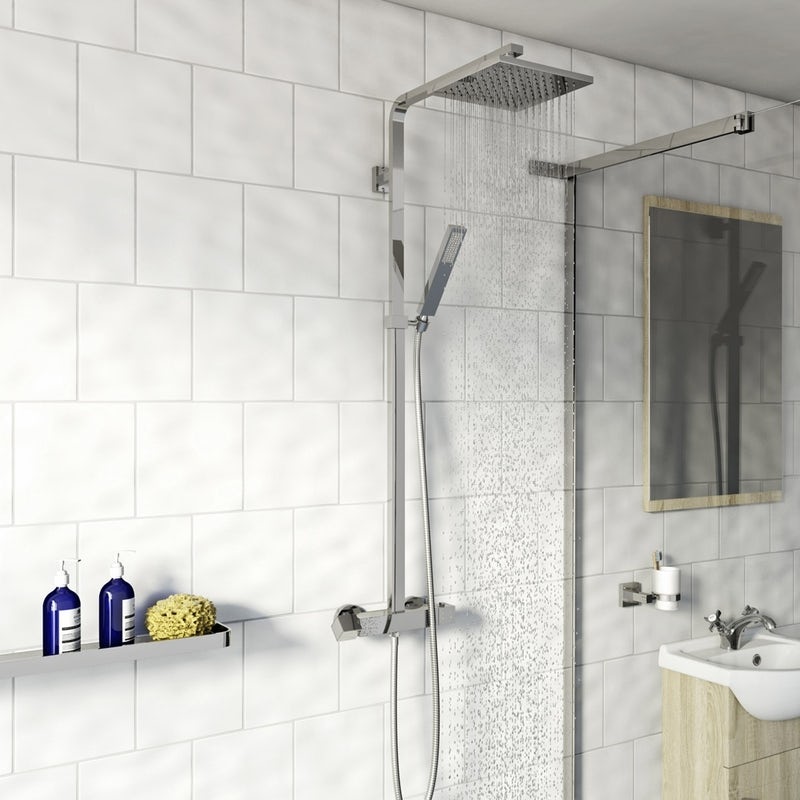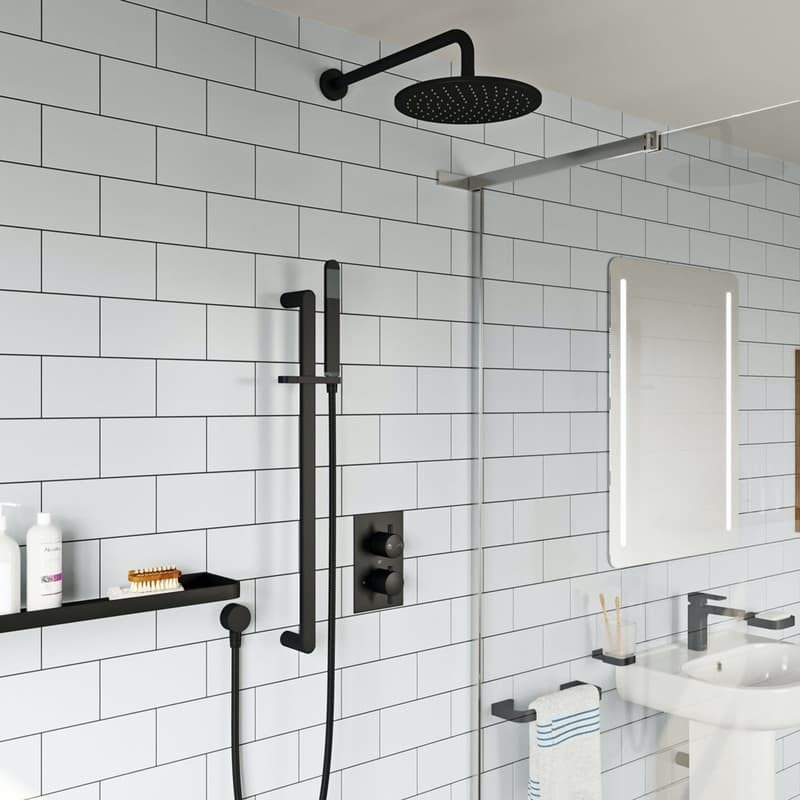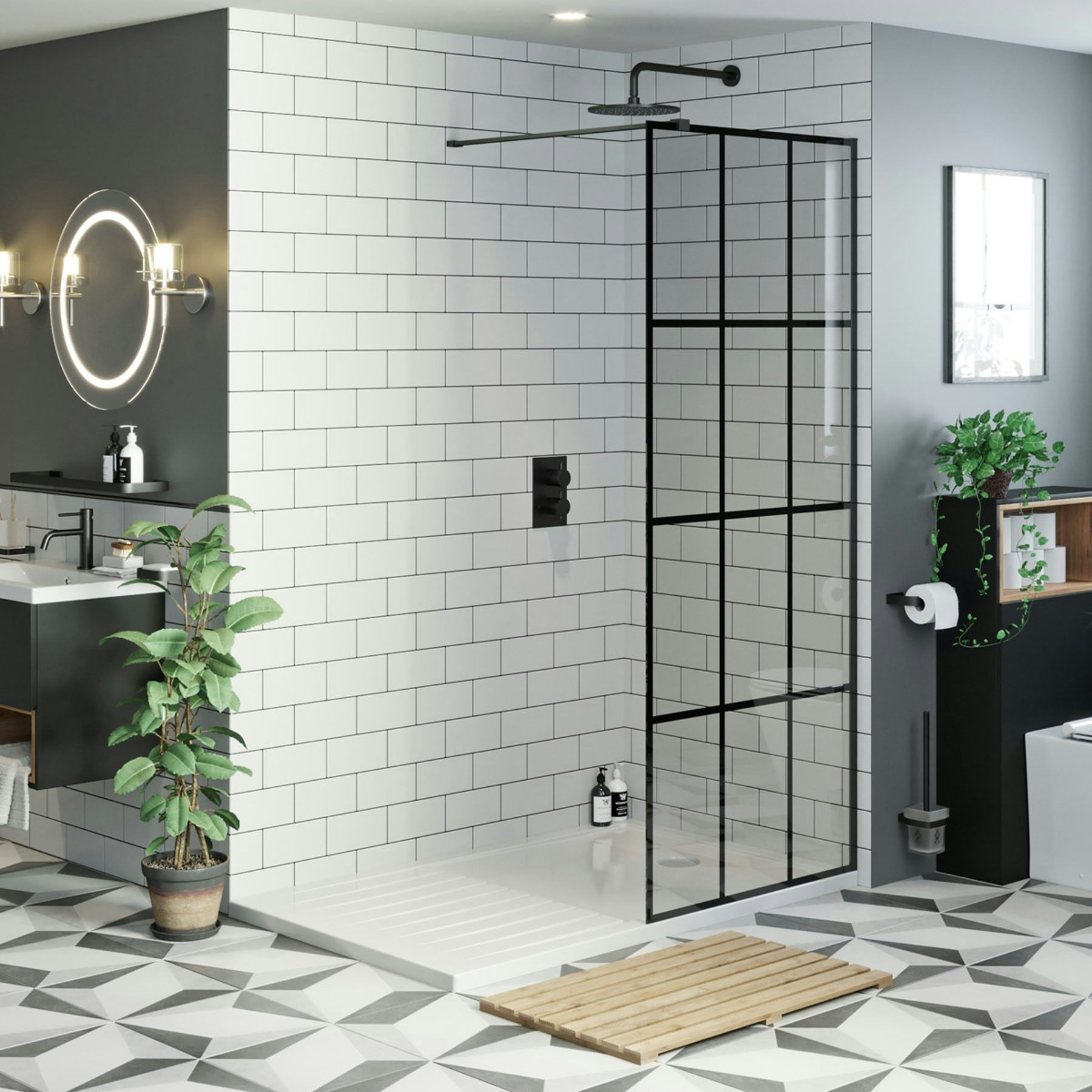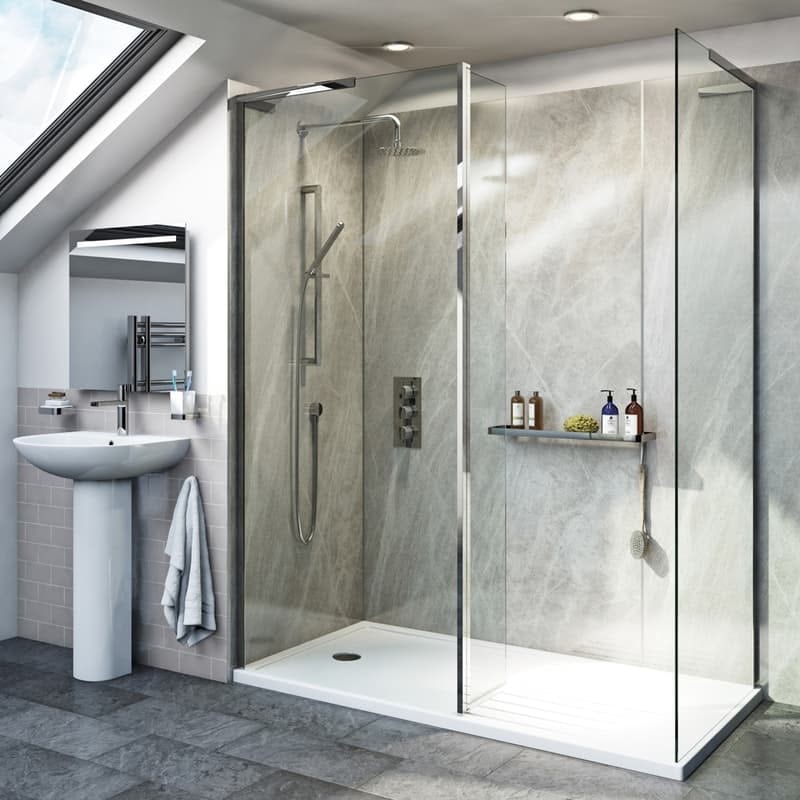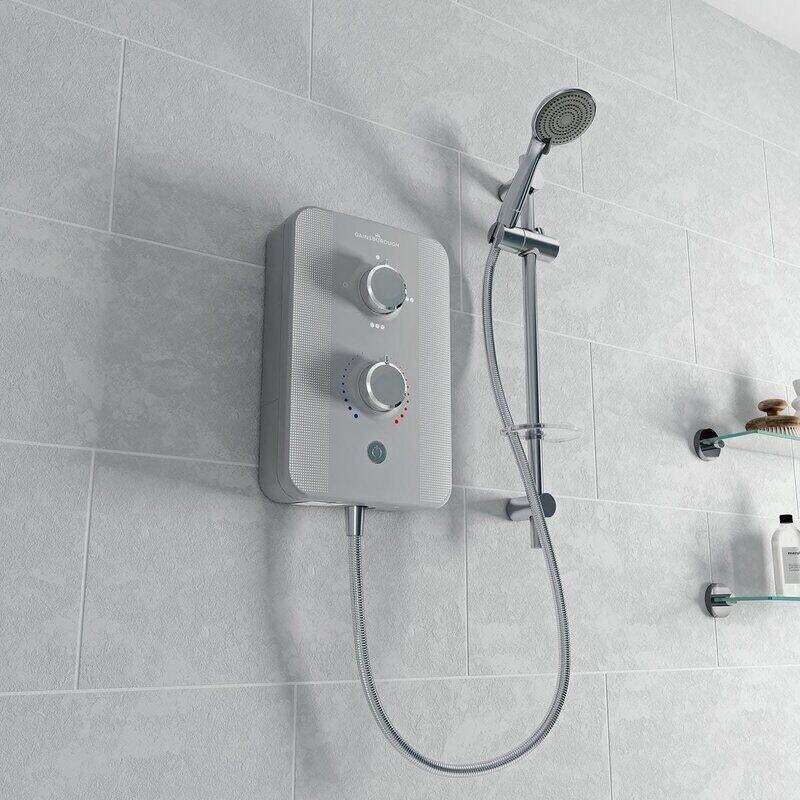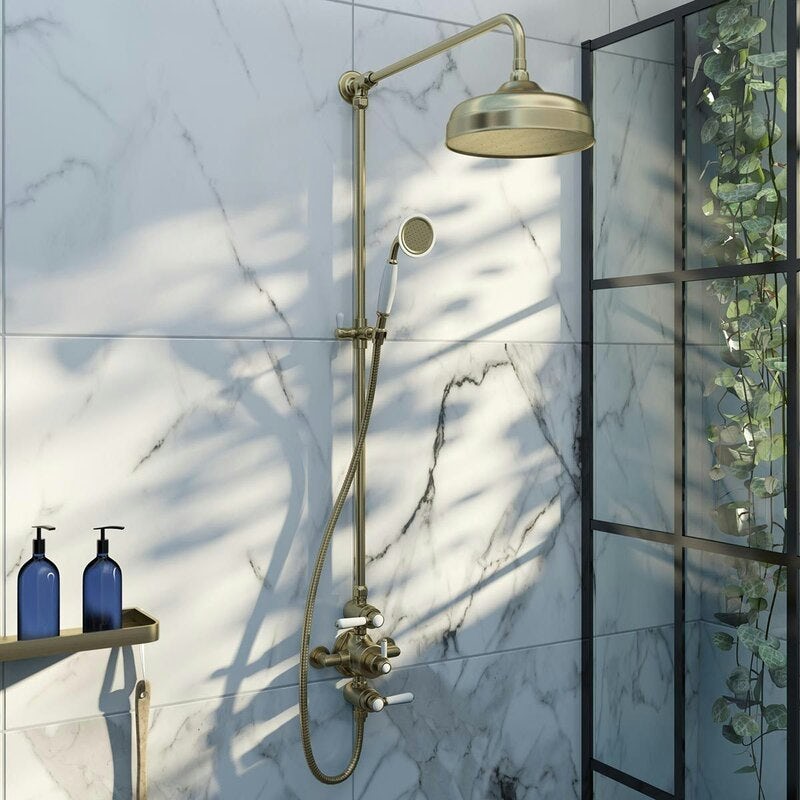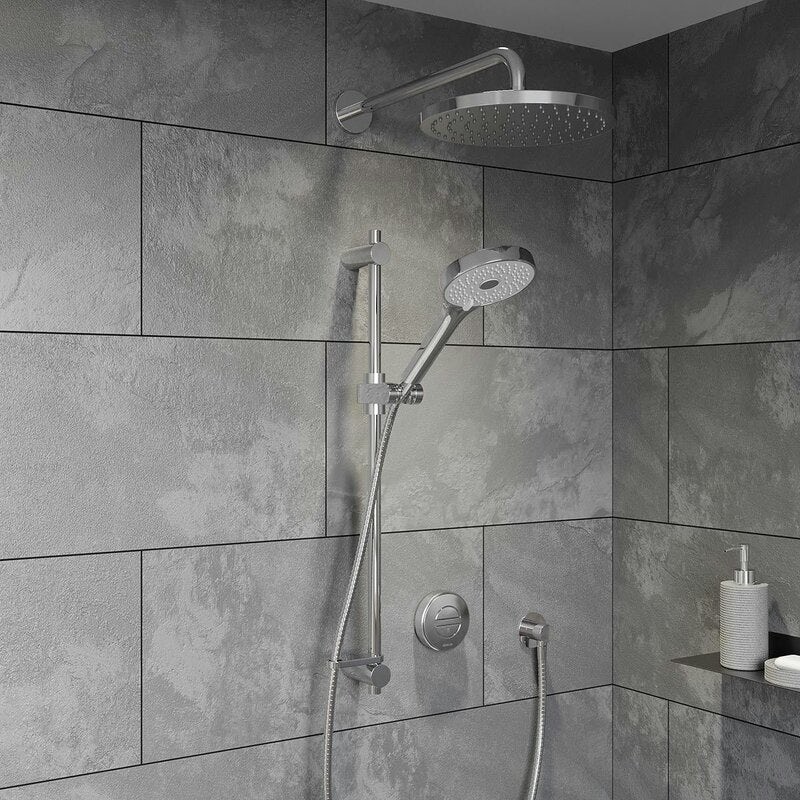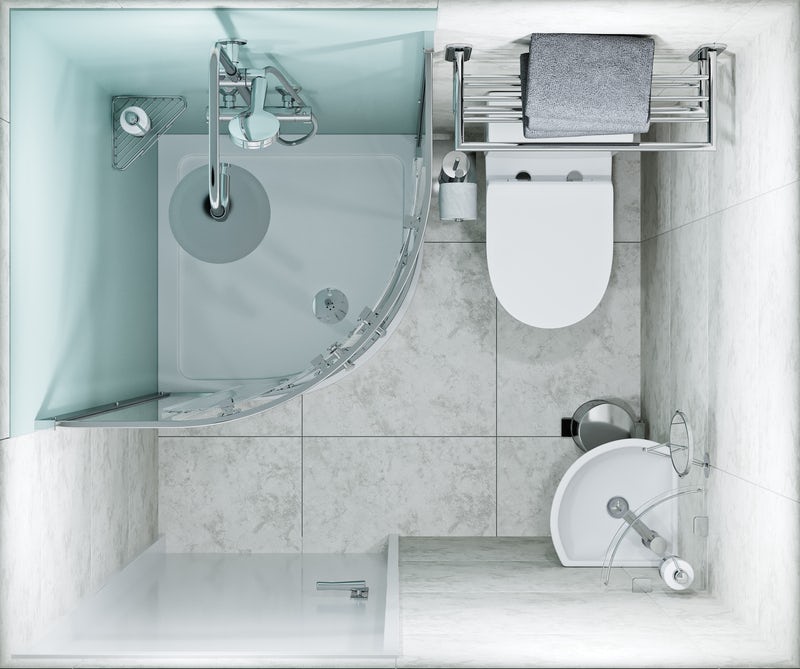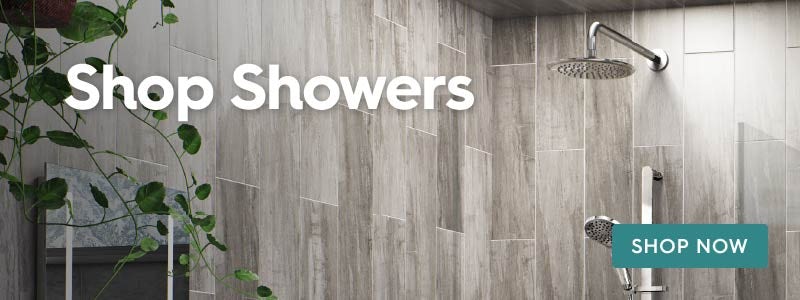Curious about showers? We've gathered 10 of the most common questions you have about showering and provided detailed answers so you can make confident choices when buying for your bathroom.
Hi, my name’s Adam, and I’m the resident bathroom buff here at Victoria Plum. For over 10 years, I’ve been answering your many and varied questions about toilets, taps and everything in between, to help arm you with all the answers you need.
Continuing our series of helpful articles, I’ve gathered up your most common questions about showers and answered them as honestly and clearly as I can. So, when the time comes to make your purchase, you’ll have everything you need to know to.
Can you see your question in the list below? If so, click on the link to reveal the answer. Or simply read through—the choice is yours!
Your questions about showers
- What type of showers are best?
- How much does it cost to install a shower in the UK?
- Are walk in showers worth it?
- Do walk in showers get water everywhere?
- Which is better: electric or thermostatic showers?
- What should I look out for when buying a shower?
- How do I clean a shower head?
- How do I save water in the shower?
- How do I unclog a shower drain?
- What is the best shower enclosure for a small bathroom?
1. What type of showers are best?
Determining what type of shower is best for you will depend on several factors, including personal preferences, available space, budget and your specific needs.
Popular shower options include:
a. Thermostatic mixer showers
These showers blend hot and cold water to maintain a stable temperature, offering comfort and safety, especially for families with children or elderly members.
Top tip: Find out what a mixer shower is in our in-depth guide
b. Electric showers
Ideal for households with limited hot water supply or low water pressure, electric showers heat water on demand, providing consistent temperature control.
c. Power showers
Suitable for homes with low water pressure, power showers use an integrated pump to boost water flow, delivering a revitalising shower experience.
d. Digital showers
Featuring advanced technology, digital showers offer precise temperature control and customisable settings. They often come with remote controls or touchscreen interfaces for convenience. In some instances, they can even be controlled using an app on your phone.
Thermostatic showers, like the Wye thermostatic shower pictured above, are one of the most popular choices for British bathrooms
2. How much does it cost to install a shower in the UK?
After surveying bathroom fitters, we believe it costs somewhere between £330 to £430 to install a conventional mixer shower in the UK. As you might expect, with the addition of electrical installation, an electric shower will cost a little more to install, in the region of between £500 to £550.
Of course, costs can vary for multiple different reasons, including your geographical location within the United Kingdom (there may be more competition in a big city, rather than an isolated village), and the complexity of the job (especially if additional plumbing is required).
Top tip: Check out the most up-to-date bathroom installation costs in our comprehensive guide.
The cost of fitting a shower set, like the Spencer round black twin diverter above, is relatively inexpensive, provided you're swapping like for like
3. Are walk in showers worth it?
Depending on your circumstances, walk in showers are very much worth it, especially if you require easy access to your shower or want to create a more open, spacious feel to your bathroom.
Walk in showers are ideal for those who experience issues with mobility, such as older people or those with some form of disability. When compared to shower baths, which require the user to climb in, or conventional shower enclosures, which can be raised significantly off the ground, there is a reduced risk of slips and trips.
Along with ease of access, walk in showers can make your bathroom feel larger and more open. Walk in shower trays tend to be more slimline in appearance, while fewer metal profiles are required. They are especially favoured by those opting for a modern, designer look.
On the downside, walk in showers can cost a little more than conventional shower enclosures, and they can be a little draughty, as the humidity from your shower enclosure is less contained. If this has captured your imagination, check out our Easy Switches guide to swapping your bath for a shower.
Fitting a walk in shower, like this one with black framed panel and stone shower tray from Mode Bathrooms, is certainly worth the effort if you're looking to create a genuinely designer bathroom
4. Do walk in showers get water everywhere?
Not necessarily. As long as you have a glass panel or partition between your shower and the rest of your room, this should be sufficient to contain splashes and keep the rest of your bathroom dry.
Top tip: If you do need extra protection from splashes, you can always fit a return panel (a tall but narrow piece of glass positioned near the entrance) and/or an end panel (directly behind the entrance) to your enclosure configuration (see below).
For added splash protection, this walk in shower enclosure pack from Mode Bathrooms comes complete with a return panel, plus an end panel
5. Which is better: electric or thermostatic showers?
The answer to whether electric or thermostatic showers are better completely depends on your needs.
Thermostatic showers:
- maintain a consistent water temperature
- are more straightforward to fit as they don’t require any electrical connections
- offer more temperature settings than basic electric showers, which often only have a select range of settings
- are more energy-efficient as they don’t require as much electricity to heat up the water
- have a longer lifespan, as they have no exposed heating elements
- require a hot water supply
Electric showers, on the other hand:
- heat water as and when you need it
- are simple to operate, with intuitive controls
- are great for rented homes or brand new shower rooms or ensuites, as they don’t require a hot water supply
- require an electrician to fit, as well as a plumber
- can have a shorter lifespan than thermostatic showers, as heating elements can break down
- consume more energy, as they require more to heat up the water
- can produce a lower rate of flow than thermostatic mixer showers
Top tip: For a more thorough analysis, read our in-depth article on electric showers v mixer showers.
The Gainsborough Slim Duo electric shower is inexpensive and offers a great solution for rental properties and new shower rooms, where a hot water supply may not be present
6. What should I look out for when buying a shower?
There are several things you need to look out for when buying a shower. Here are some of the main considerations:
a. End users
It pays to think carefully about who will use your shower. For example, if different family members share your shower, look for shower slider rail kits, where the shower head height and angle is adjustable.
b. Water heating system
Work out which water heating system you have in your home and how good your water pressure is. If it’s poor you may wish to add a shower pump, fit a power shower or even consider showers for low pressure water systems.
c. Style and colour
Next, think about the style or overall design of your shower. For example, are you looking for something more vintage to complement a traditional bathroom? Do you fancy a special finish, like black or brushed brass (see below), to fit in with your décor?
d. Placement
Finally, consider where the shower will be placed. Will it fit above your bath? If so, you may need a shower bath screen.
With a brushed brass finish, the Aylesford Vintage shower system is the perfect choice for traditional bathrooms
7. How do I clean a showerhead?
Giving your showerhead a quick clean with mild household cleaner and cloth once a week, will help to maintain its performance, keeping limescale and dirt at bay. For full instructions, especially if you’re looking to rid your shower of mould and mildew, read our Quick Fixes guide to cleaning a showerhead and watch the video below.
8. How do I save water in the shower?
There are many things you can do to save water when showering, ranging from the obvious to the more obscure:
a. Shorten your shower duration
If you know you spend too much time relaxing beneath that raging torrent, why not try shortening your showers? Play a song (a Bluetooth shower head speaker comes in very handy!) that lasts around 4 minutes or set a timer, so you know when to get out. Some digital showers also come with timers built-in.
b. Turn the shower off while lathering up
There’s no need for the water to be running while you’re scrubbing with soap or shampoo. Simply turn it back on for rinsing.
c. Upgrade your shower
Keep an eye out for airmix showerheads, which draw air into the flow, reduciung the amount of water you use. Or, upgrade to an electric or digital shower which often feature eco modes that cut water usage.
d. Collect your pre-heated water
Whilst you’re waiting for your shower to warm up, place a bucket beneath it to catch the cooler water. You can then use this to water plants later.
Check out our top water-saving shower tips in our handy article and discover our eco bathrooms range, which contains a wide selection of water-saving showers.
Control the duration of your shower to the second and save water with the Aqualisa Unity Q Smart shower
9. How do I unclog a shower drain?
To keep your shower tray draining smoothly, you should give it some TLC every few months. It’s easer than you think:
a. Unscrew the cover
First, pop off the shower drain cover. Most simply lift out, but if yours has screws, find the right screwdriver and gently remove them.
b. Rinse the seal
You'll see a rubber seal keeping nasty smells at bay. No need to remove it—just give it a good rinse under warm running water to wash away any grime.
c. Hair today, gone tomorrow
Inside is a plastic cup—grab it and pull out any hair that is caught. Wash the cup with warm water, mild soap and a sponge or cloth.
d. Seal the deal
Once everything's clean, pop the cup and seal back in place, and your shower is ready to go again.
For further information, check out our shower trap waste guide or watch the video below to see what goes into a modern shower tray waste.
10. What is the best shower enclosure for a small bathroom?
Tired of feeling cramped in your tiny bathroom? A quadrant shower enclosure is your space-saving hero! These clever designs hug the corner, freeing up precious real estate. Plus, sliding doors mean no extra room needed for swinging them open—maximising your bathroom enjoyment.
Quadrant shower enclosures with sliding doors offer plenty of great space-saving features for small bathrooms
More helpful advice on showers and shower enclosures
When it comes to showers and shower enclosures, you’ll find all the help and information you need, right here at Victoria Plum.
For a general overview, why not visit our expert buying guides:
If it’s inspiration you’re seeking, we’d highly recommend taking a look through our latest shower ideas.
If you still have a question about showers which we haven’t answered above, head to our help centre, where you’ll find many more FAQs, or why not contact us? We’ll do all we can to help.
Shop showers
Now you have all the showering know-how you need, why not explore our incredible selection of showers? Click below to browse and discover your perfect shower.

